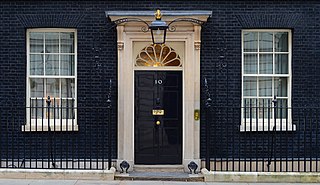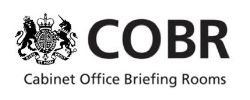
The Cabinet of the United Kingdom is the senior decision-making body of His Majesty's Government. A committee of the Privy Council, it is chaired by the Prime Minister and its members include Secretaries of State and other senior ministers. Members of the Cabinet are appointed by the Prime Minister and are by convention chosen from members of the two houses of the Parliament of the United Kingdom, the House of Commons and the House of Lords.
The Civil Contingencies Committee is a British cabinet committee chaired by the Home Secretary. It is intended to deal with major crises such as terrorism or natural disasters. It is supported by the Civil Contingencies Secretariat, which is part of the Cabinet Office.
The Civil Contingencies Secretariat (CCS), created in July 2001 and disbanded in July 2022, was the executive department of the British Cabinet Office responsible for emergency planning in the UK. The role of the secretariat was to ensure the United Kingdom's resilience against disruptive challenge, and to do this by working with others to anticipate, assess, prevent, prepare, respond and recover. Until its creation in 2001, emergency planning in Britain was the responsibility of the Home Office. The CCS also supports the Civil Contingencies Committee, also known as COBR.

10 Downing Street in London is the official residence and office of the Prime Minister of the United Kingdom.

The first minister of Scotland is the head of the Scottish Government and is the keeper of the Great Seal of Scotland. The first minister chairs the Scottish Cabinet and is primarily responsible for the formulation, development and presentation of Scottish Government policy. Additional functions of the first minister include promoting and representing Scotland in an official capacity, at home and abroad.

The Cabinet Office is a ministerial department of the Government of the United Kingdom. It is responsible for supporting the prime minister and Cabinet. It is composed of various units that support Cabinet committees and coordinate the delivery of government objectives via other departments. As of December 2021, it had over 10,200 staff, mostly civil servants, some of whom work in Whitehall. Staff working in the Prime Minister's Office are part of the Cabinet Office.

The Department for Culture, Media and Sport (DCMS) is a ministerial department of the Government of the United Kingdom. It holds the responsibility for culture and sport in England, and some aspects of the media throughout the UK, such as broadcasting. Its main offices are at 100 Parliament Street, occupying part of the building known as Government Offices Great George Street.
A number of military citadels are known to have been constructed underground in central London, dating mostly from the Second World War and the Cold War. Unlike traditional above-ground citadels, these sites are primarily secure centres for defence coordination.

The Churchill War Rooms is a museum in London and one of the five branches of the Imperial War Museum. The museum comprises the Cabinet War Rooms, a historic underground complex that housed a British government command centre throughout the Second World War, and the Churchill Museum, a biographical museum exploring the life of British statesman Winston Churchill.
David Southwell is a British writer, and the author of several books on conspiracy theories and organized crime. He has also written scripts for Independent British comic books.

The Scottish Government Resilience Room (SGoRR) is the emergency and crisis response co–ordination facility of the Scottish Government that is activated in cases of national emergency or crisis, or during events abroad with major implications for Scotland and the wider British Isles. It is located in Scotland's capital city and seat of power, Edinburgh, at St Andrew's House, the official headquarters of the Scottish Government. Prior to February 2008, it was called the Scottish Government Emergency Room, or "SEER", from the former name "Scottish Executive Emergency Room".
The counter-terrorism page primarily deals with special police or military organizations that carry out arrest or direct combat with terrorists. This page deals with the other aspects of counter-terrorism:

The Terrorist Hunters is a controversial non-fiction book by former senior police officer Andy Hayman, co-written by Margaret Gilmore, about Hayman's role as head of the Metropolitan Police's Specialist Operations Division. The Attorney General for England and Wales, Baroness Scotland QC, sought, and initially won, a High Court injunction against the publication of the book. The book was reported to have sold 2,500 pre-order copies before the injunction was issued.

The National Security Council is a United Kingdom cabinet committee. The Council's terms of reference were said in September 2022 to include matters relating to national security, foreign policy, defence, trade, international relations, development, resilience and resource security.

Ed Miliband became Leader of the Labour Party and Leader of the Opposition upon being elected to the former post on 25 September 2010. The election was triggered by Gordon Brown's resignation following the party's fall from power at the 2010 general election, which yielded a Conservative–Liberal Democrat Coalition. Miliband appointed his first Shadow Cabinet in October 2010, following the Labour Party Shadow Cabinet elections. These elections were the last such elections before they were abolished in 2011.
The 1972 United Kingdom miners' strike was a major dispute over pay between the National Union of Mineworkers (NUM) and the Conservative Edward Heath government of the United Kingdom. Miners' wages had not kept pace with those of other industrial workers since 1960. The strike began on 9 January 1972 and ended on 28 February 1972, when the miners returned to work. The strike was called by the National Executive Committee of the NUM and ended when the miners accepted an improved pay offer in a ballot. It was the first time since 1926 that British miners had been on official strike, but there had been a widespread unofficial strike in 1969.

The National Security Committee (NSC) of Ireland is a secretive inter-departmental committee responsible for ensuring that the Taoiseach and Government of Ireland are kept informed of high-level national security, intelligence and defence issues, and the state's response to them.

Sir Christopher John MacRae Whitty is a British epidemiologist, serving as Chief Medical Officer for England and Chief Medical Adviser to the UK Government since 2019.
COBRA is a British political thriller television series that premiered on 17 January 2020 on Sky One. The six-episode first series is written by Ben Richards and stars Robert Carlyle and Victoria Hamilton.
The Scientific Advisory Group for Emergencies (SAGE) is a British Government body that advises central government in emergencies. It is usually chaired by the United Kingdom's Chief Scientific Adviser. Specialists from academia and industry, along with experts from within government, make up the participation, which will vary depending on the emergency. SAGE gained public prominence for its role in the 2020 COVID-19 pandemic in the United Kingdom.












